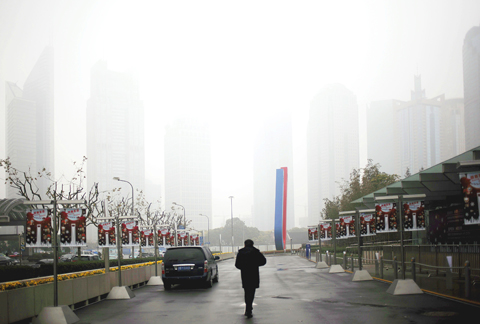China has moved to support its economic recovery by extending tax cuts and subsidies for purchases of small vehicles and appliances, while adjusting some measures to counter rising property prices.
Wednesday’s announcement follows China’s annual economic strategy meeting, with leaders promising on Monday to keep economic stimulus and easy credit policies in place.
Domestic demand is seen as crucial for future growth, but economists say consumer spending accounts for less than half of China’s economic activity.

PHOTO: BLOOMBERG
The State Council statement posted online on Wednesday says China should continue its current policies, including subsidies, to push consumption.
A tax cut on sales of cars with engines of 1.6 liters or smaller was extended until the end of next year, but the tax was raised to 7.5 percent from the current 5 percent — a rate slashed by half earlier this year to counter a slump in sales due to the global downturn.
Subsidies would be raised from the current rate of up to 5,000 yuan (US$878) to as high as 18,000 yuan for purchases of some vehicle models. But they do not apply to any vehicles with engine capacity bigger than 2 liters, the statement said.
The announcement was a further boon to automakers who have done a booming business this year, with total sales exceeding 12 million units by last month, up 42 percent over a year earlier, the China Association of Automobile Manufacturers said. Of that total, 85 percent have been small vehicles.
In a move aimed at countering speculation in real estate that has drawn complaints that housing prices are becoming unaffordable for many families, the government reintroduced a 5.5 percent business tax on sales of homes bought less than five years earlier.
The tax had been suspended last year as property sales slumped as the economy slowed due to plunging exports.

FREEDOM OF NAVIGATION: The UK would continue to reinforce ties with Taiwan ‘in a wide range of areas’ as a part of a ‘strong unofficial relationship,’ a paper said The UK plans to conduct more freedom of navigation operations in the Taiwan Strait and the South China Sea, British Secretary of State for Foreign, Commonwealth and Development Affairs David Lammy told the British House of Commons on Tuesday. British Member of Parliament Desmond Swayne said that the Royal Navy’s HMS Spey had passed through the Taiwan Strait “in pursuit of vital international freedom of navigation in the South China Sea.” Swayne asked Lammy whether he agreed that it was “proper and lawful” to do so, and if the UK would continue to carry out similar operations. Lammy replied “yes” to both questions. The

‘OF COURSE A COUNTRY’: The president outlined that Taiwan has all the necessary features of a nation, including citizens, land, government and sovereignty President William Lai (賴清德) discussed the meaning of “nation” during a speech in New Taipei City last night, emphasizing that Taiwan is a country as he condemned China’s misinterpretation of UN Resolution 2758. The speech was the first in a series of 10 that Lai is scheduled to give across Taiwan. It is the responsibility of Taiwanese citizens to stand united to defend their national sovereignty, democracy, liberty, way of life and the future of the next generation, Lai said. This is the most important legacy the people of this era could pass on to future generations, he said. Lai went on to discuss

MISSION: The Indo-Pacific region is ‘the priority theater,’ where the task of deterrence extends across the entire region, including Taiwan, the US Pacific Fleet commander said The US Navy’s “mission of deterrence” in the Indo-Pacific theater applies to Taiwan, Pacific Fleet Commander Admiral Stephen Koehler told the South China Sea Conference on Tuesday. The conference, organized by the Center for Strategic and International Studies (CSIS), is an international platform for senior officials and experts from countries with security interests in the region. “The Pacific Fleet’s mission is to deter aggression across the Western Pacific, together with our allies and partners, and to prevail in combat if necessary, Koehler said in the event’s keynote speech. “That mission of deterrence applies regionwide — including the South China Sea and Taiwan,” he

UNPRECEDENTED: In addition to the approved recall motions, cases such as Ma Wen-chun’s in Nantou are still under review, while others lack enough signatures The Central Election Commission (CEC) announced yesterday that a recall vote would take place on July 26, after it approved the first batch of recall motions targeting 24 Chinese Nationalist Party (KMT) lawmakers and Hsinchu Mayor Ann Kao (高虹安). Taiwan is in the midst of an unprecedented wave of mass recall campaigns, following a civil society push that echoed a call made by Democratic Progressive Party (DPP) caucus whip Ker Chien-ming (柯建銘) in January to initiate signature drives aimed at unseating KMT legislators. Under the Civil Servants Election and Recall Act (公職人員選舉罷免法), Taiwanese can initiate a recall of district-elected lawmakers by collecting